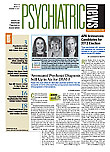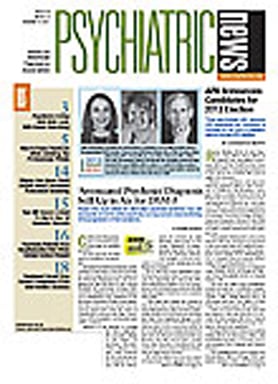Individuals who experience a first episode of psychosis and their family members differ dramatically in perceptions about who first recognized that something was wrong, according to a survey of patients and family by the National Alliance on Mental Illness (NAMI).
Approximately 40 percent of individuals who experienced psychosis said initial insight came from recognizing symptoms themselves, while 18.2 percent said their parents saw the symptoms first and intervened. Among family and friends, only 13.1 percent said the person recognized symptoms and knew something was wrong.
Approximately 50 percent of family members said it was the family who recognized symptoms and intervened.
The finding was among the most striking from the survey, titled "First Episode Psychosis: Results From a 2011 NAMI Survey," which was conducted online from July 15 to July 26. The survey also found that psychiatrists were rated as very helpful, but typically intervened very "far downstream" in the process of psychosis. And many patients and family members reported a striking sense of helplessness, saying "no one" was available to help at the time of initial psychotic break (see
Key Findings).
In a teleconference with press discussing the survey, NAMI Medical Director Ken Duckworth, M.D., said the discrepancy in perceptions reflects the unique nature of psychosis and the difficulty people have in discussing it.
"When family members see symptoms of psychosis, they may hide behind the hope that the individual is having a bad day or is just a little 'off' and not say anything," Duckworth said. "And people who have had the experience may have known for a very long time that they were different or that something was wrong. This really speaks to the complexity of the illness and the shame that people feel about this condition, and the socially challenging nature of discussing something as fundamental as one's grasp on reality."
Psychiatrists ranked high among those who were rated "most helpful"—family members ranked them highest and patients ranked them second only to parents in a list that included psychologists/social workers, friends, coworkers, and emergency and crisis intervention personnel, among others.
But only a small percentage (4.5 percent of patients and 1.6 percent of family members) credited psychiatrists or other health care providers including primary care physicians as having first recognized symptoms, suggesting that clinicians become involved only "downstream" in the process.
Higher proportions (7.2 percent and 7.4 percent, respectively) credited "first responders" such as police and emergency medical technicians for recognizing symptoms and intervening. Proportionately, the gap between providers (1.6 percent to 4.5 percent) and first responders (7.2 percent) is small, but it may still reflect that recognition and intervention in the onset of mental illness come more often at a crisis point than in a doctor's office, according to the report.
Approximately 20 percent of both individuals who experienced psychosis and their families and friends felt that "no one" helped when the onset of symptoms occurred.
During the teleconference, Rick Huber, a patient with schizophrenia, reported that these findings were consistent with his own experience. Huber said that he had known for several years that something was wrong but found treatment only after he had encounters with law enforcement.
The online survey garnered 1,215 responses from people who identified themselves as having personally experienced psychosis. There were 2,882 respondents who had witnessed someone in early stages of psychosis.
The average age of people who had experienced psychosis was 24 at the time symptoms first began. The oldest age at time of onset was 63, and the youngest age 3. Among family members and friends who responded to the survey, parents were most likely to have witnessed early stages of psychosis in an individual: 62.4 percent. The four largest other subgroups were siblings (15.1 percent), spouses or partners (11.5 percent), the individual's own children (9.6 percent) and friends (7.5 percent).
Duckworth said the survey findings lend credence to the addition of a psychosis risk syndrome, which APA's Work Group on Schizophrenia and Other Psychotic Disorders has proposed for inclusion in DSM-5. It would describe diagnostic criteria for individuals who demonstrate risk factors for psychosis, but who have not yet had an acute psychotic break.
Earlier this year NAMI submitted to APA a white paper supporting the new diagnosis but included a list of precautions, including a firm emphasis on psychosocial treatments. "[S]ince early studies suggest that most individuals diagnosed with risk syndrome will not develop psychosis, special care must be taken to educate clinicians that psychosocial interventions and supports, including family education, are first-line strategies for responding to individuals with risk syndrome," the NAMI paper stated. "The threshold for prescribing antipsychotic medications should be very high, in view of the high prevalence of false positive diagnoses and the lack of research on the impact of these medications on youth."
For psychiatrists, Duckworth said the cumulative message from the report is the need to be involved farther "upstream," earlier in the process of a first psychosis. This will require them to be embedded in the community—in schools, crisis intervention clinics, and other venues where the very earliest signs of psychosis occur.
"Psychiatrists are a pretty small part of the experience of first psychosis," he said. "The recognition of symptoms happens within the family and in the community. If psychiatrists are involved in the community in addition to seeing patients in an office, they may be better able to connect with families and other parties in the community [that play a more direct role in early psychosis]."
The survey report is posted at <www.nami.org/FirstEpisode/firstepisodesurvey.pdf> 
Key Findings
Differences in perceptions exist between individuals who experienced psychosis and their families and friends over who first knew something was wrong and that help was needed.
Only a small percentage of both groups credited health care providers as having recognized symptoms—which suggests that providers become involved only "downstream" in the process.
Approximately 20 percent of both individuals who experienced psychosis and their families and friends felt that "no one" helped when the onset of symptoms occurred. This was the single greatest proportion of responses to a question about who had been "most helpful," suggesting a significant level of isolation.
Sources of information, support, and assistance exist, but they are often fragmented, uncoordinated, or difficult to find. Providers do not necessarily refer individuals or families to complementary or supplementary programs in the community, such as support groups.
Families and individuals report that their needs for information regarding their experience with early-episode psychosis are met through their own resourcefulness, usually through the Internet or informal networking.

